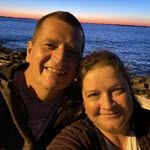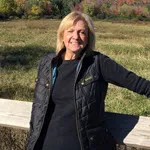COVID-19 Changed Everything: 3 Personal Stories
COVID-19 Changed Everything: 3 Personal Stories
As we prepare to say goodbye to 2020, we reconnected with some of the COVID-19 patients who shared their stories with us this year. We asked where they find themselves now, how their experience with COVID changed their lives, and what they would want readers to keep in mind moving forward.
Joe Fusco

In July 2020, Joe shared the heartbreaking story of COVID’s spread through his large Italian family: “One by one, my family members started getting sick -- and dying unbelievably fast. Before all was said and done, at least 19 members of my family contracted COVID-19. Seven of us, including me, were hospitalized. All but one ended up on ventilators, fighting for our lives.”
Five of Joe’s family members -- his mother, sister, two brothers, and an aunt -- died from COVID.
Several months later, Joe says he still doesn’t feel back to his pre-pandemic self physically, mentally, or psychologically and isn’t sure he ever will be.
“I struggle to balance what was and what is. I miss my family I lost, and although I put up the strong -- you got to move on -- front, I just keep pretending they are still there and I will wake up one day from this bad dream. I would say the rest of my family is experiencing the same,” Fusco explains. “It’s really hard to wrap our heads around what happened to us.”
Fusco lost 55 pounds while he was sick and says many months later, he still doesn’t feel as strong physically as he once did unless he challenges himself, which he says is hard to do. “I’m afraid of hurting myself or, worse yet, others counting on my strength of the past,” he explains.
He says this experience has made him appreciate everyone and everything in his life and urges others to realize how much is at stake in this pandemic. “Be overly cautious,” Fusco says. “It can happen to you and the ones you love. Pray to whoever and whatever you pray to that what happened to my family doesn’t happen to you.”
Rachel Baum

Pre-pandemic, Rachel was a very active woman. The retired dog trainer lives near a lake and would kayak on it sometimes twice a day. She also took a 3-mile walk every day and practiced tap dancing (a new passion) almost an hour a day.
Then she got COVID-19, and everything changed. Her symptoms were most acute for about a month, but they never went completely away. Many months later, she’s now considered a "long hauler" and says she is learning to live with a new chronic illness.
“It’s been a bit more than 8 months since I first got sick. Unfortunately, these past 2 months have been worse than the initial illness back in March. I am very limited in what I can do physically. If I overdo, I pay for it relatively quickly in shortness of breath and fatigue,” Baum explains. “Being short of breath is not an apt description. I can feel it coming on, the heaviness in my chest, the knife between my shoulder blades, and then the struggle to get adequate air in."
Baum says the struggle to breathe normally goes on for 1-4 hours before it ebbs. A rescue inhaler sometimes helps, but not always. “I can't even begin to describe how scary and helpless that feeling is,” she says. “Every time it happens, I wonder if this is will be the time that I pass out and never wake up.”
These days, Baum is trying to figure out what constitutes "overdoing it” for her new reality. Doing any one thing -- like laundry -- requires lying down for an hour or more to recover. “On a good day, I might be able to do two things -- grocery shopping and one errand -- in the morning, but then I have to lie down for the afternoon. Basically, I have learned how to cope with the chronic illness that is long COVID,” Baum says.
One bright spot: The hair loss she was experiencing seems to be improving. “My hair is coming back in. For a while, I was wearing a hairpiece. I bought a full wig, just in case, but thankfully have not had to use it,” Baum says, admitting that she still has some really down days.
“It doesn't take much to make me cry. I met virtually with a therapist twice. I try to keep my mind occupied so I don't think about the limitations,” Baum says. “I can't read because of the brain fog, so I knit -- a lot! -- do crafts, shop online, write to friends. My mantra is, "I'm not dead and I'm not on a ventilator." I feel very lucky to be alive.”
Akhink Omer

Akhink was a healthy 31-year-old nurse with no health issues when she got COVID and ended up hospitalized for 8 days. She was terribly ill and also struggled with the isolation and mental toll that comes with fighting the virus alone. But since recovering, she’s been fortunate not to have any long-term effects from the virus.
“It did take me almost 3 weeks after being released from the hospital to get back to my normal self physically. Right after that I took my first travel nurse position at a COVID-only hospital in Boston,” Omer says. “That was a very tough 7 weeks since it was from April-May and at the height of COVID in the state. We had patients die every single night, and it was difficult to see people lose their lives to something that I had recovered from. These patients were some of the sickest I had ever cared for, and we spent many nights crying with families as they said goodbye to a loved one through an iPad. I don't think that's something that myself or any of the other nurses will ever forget.”
Omer spent the next 6 months working at a COVID facility in Maryland and is now in Amarillo, TX, on another COVID RN job. “I am 100% back to my pre-COVID self and realize how fortunate I am,” Omer says. “I know people personally and have had patients who still suffer from long-term effects of the virus. Some still don't have their sense of taste and smell back months later, and some have unexplained headaches that they never had before the virus.”
In the current surge of patients being admitted into the hospital, Omer encourages everyone to wear their masks, wash their hands, and social distance as much as possible. She says when a vaccine becomes available, she will get it as quickly as she can. “With the release of the COVID-19 vaccines in the coming weeks, my hope is that this nightmare might be over soon,” Omer says. “Once it is available to me, I will gladly roll up my sleeve and get the vaccine. As people are deciding whether or not to get the vaccine, I hope they consider that death from COVID is worse than any side effect from a vaccine.”






No comments:
Post a Comment